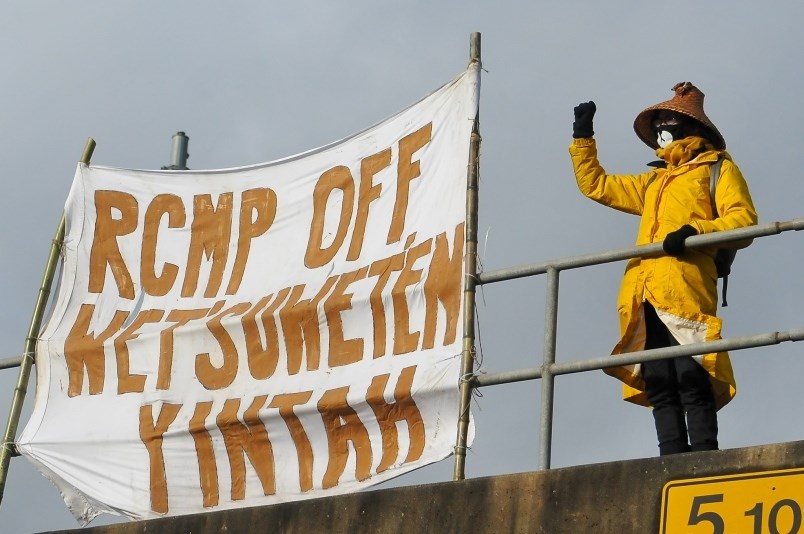New Westminster is urging senior governments to begin good-faith consultation with the Wet’suwet’en People.
On Monday, council approved a motion by Coun. Nadine Nakagawa calling on the provincial and federal governments to suspend permits authorizing construction of the Coastal GasLink project and to begin good-faith consultation with the Wet’suwet’en People. The motion also asks the federal and provincial governments to end any attempts at forced removal of Wet’suwet’en People from their traditional territories and to refrain from any use of coercive force against Wet’suwet’en People who are seeking to prevent construction of the Coastal GasLink pipeline through non-violent methods.
The preamble to the motion states the Wet’suwet’en hereditary chiefs, whose representative role is recognized by the Supreme Court of Canada, have indicated a lack of consent for the Coastal GasLink pipeline through their unceded territory. It also states that Canada is party to the Paris Agreement, which includes commitments to significantly reduce greenhouse gas emissions and to pursue efforts to keep global warming below 1.5 C, and that the City of New Westminster has declared a climate emergency, has endorsed the Truth and Reconciliation Commission’s calls to actions and has prioritized reconciliation in its strategic plan.
“I recognize that this is a complicated and very sensitive issue,” Nakagawa said. “I think when we come at it from a settler government perspective, it is really difficult to understand the complexity of this situation, and there is multiple news reports coming from a lot of different places about the nature of the dispute. “
Nakagawa said she had “some hesitation” in bringing the motion forward because she’s hesitant to wade into a situation involving elected band councils and hereditary chiefs, as it’s an issue she can’t fully comprehend.
“But at the same time I am chilled and horrified by watching people removed from their territory by RCMP. Seeing the red dresses hanging in Wet’suwet’en territory and seeing those removed as they attempt to build a pipeline through there,” she said.
Red dresses, which are symbolic of the epidemic of violence against Indigenous women and girls. “What the outcome of this should be, that is not for us to say, but it is very clear to me that this is just one more piece of a very long story of colonization," she said.
Nakagawa’s hope is that governments are able to sit down on a nation-to-nation basis and have a good-faith conversation with whoever needs to be at the table. She said the motion is in support of Indigenous sovereignty on that territory and recognizes that it is unceded territory.
Coun. Chuck Puchmayr was the lone council member to vote against the motion
“They are engaged in consultation, in negotiation. It has gone on for many years,” he said. “It’s not our job as city council to circumvent a democratic process in their community, and I can’t support the resolution. I am sorry.”
Some Wet’suwet’en hereditary chiefs oppose construction of the Coast GasLink natural gas pipeline, saying it was permitted without their consent. Supporters have launched blockades at various locations across Canada.
Puchmayr said 20 First Nations communities along the pipeline route have signed on to the project, including some Wet’suwet’en People. After years of consultation and public meetings, he said they supported the project because they feel it will create economic opportunities and jobs in their communities.
While he shares some of Puchmayr’s concerns, Coun. Jaimie McEvoy said he could support the motion because it was “restrained” and doesn’t take sides.
“On the one hand, you have people who have a principle that they want to see Aboriginal people get a fair share of the resource economy, get jobs and have benefits of the resource economy that other people have. That’s not an unprincipled position to take, whether you disagree with it or not. The effect of that is an effect on climate,” he said. “On the other hand we have people who are motivated by concerns about climate change, who give priority to that issue. That’s a position of principle as well.”
McEvoy said the right thing to do is to acknowledge there are fair and competing principles and there is a need for an intelligent discussion without choosing sides.
“I don’t think the resolution says it is siding with anyone in particular,” he said. “I think the resolution … essentially calls for a suspension, for further conversation in good faith and to refrain from the use of force.”
Coun. Mary Trentadue said the motion is calling for good-faith consultation to resolve the issue – something she doesn’t believe has yet occurred.
“For me, this is taking a neutral position. We are really not aligning one way or another,” said Coun. Chinu Das. “We are asking for good faith and nonviolent methods. That is not asking for that much.”
Coun. Patrick Johnstone thanked Nakagawa for writing the motion in “a very thoughtful way.”
“I am absolutely in support of good-faith consultation before this project moves forward and I am absolutely opposed to forced removal of people from traditional territories and the use of force,” he said.



